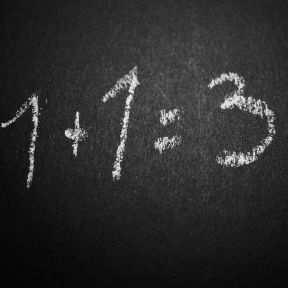KEY POINTS-
- We can learn from mistakes more than we can learn from successes.
- Learning from small mistakes helps prevent big ones.
- Most big mistakes occur when we act on feelings while indifferent to values.
“Good judgment comes from experience, and a lot of that comes from bad judgment.” —Will Rogers
Few things deplete hope as much as making mistakes, especially when they’re repeated. We’re likely to repeat them if we allow the pain of mistakes to mask their contributions to success. In fact, we can learn more from mistakes than successes. Success in love and work requires a certain amount of luck, from which we learn little.

The brain negotiates the environment in a kind of estimation-error-correction algorithm. Toddlers learn to walk by falling. Baseball players learn to hit by striking out; and if they fail only two out of three times, they’ll make the Hall of Fame. A paradigm of human learning is pitching horseshoes. The first pitch is likely to be too long or too short. The second will overcompensate. The third pitch is likely to come closest to a ringer. If we regard this as two failures and one success, our lives will be hard. It’s actually one success in three steps. Our brains thrive on estimation errors and corrections. Mistakes are nature’s way of teaching us.
No mistake is too small to teach us something. Learning from small mistakes helps prevent big ones. But we tend to focus on the big mistakes and ignore the smaller ones leading up to them. A recent client lost a lot of money in the stock market because he acted on a tip. He won’t do that again, but he ignored the smaller mistakes of rushing a trade without researching the stock and failing to rebalance his portfolio for diversification. It’s so easy to ignore small mistakes in the wake of big ones that we need a special post-mortem commission to investigate the missed warning signs of national disasters.
Learn What to Do
Learning from mistakes cannot be based on what we won’t do.
“I won’t do that again!”
For one thing, the brain isn’t good at doing negatives. The only way to not do something is to do something incompatible with it. We can’t not yell at our loved ones. But we can take their perspectives and practice compassion, in which case we won’t yell at them. The brain must know what to do under stress because under stress, all animals, including humans, regress to previously learned behaviors and habits.
“The next time I’m upset at my kids’ behavior, I’ll focus on teaching them the right things to do when they’re excited.”
“The next time I’ll remember that I love my partner when we disagree.”
“As soon as I start to get upset, I’ll go to my core value and try to improve, appreciate, connect, or protect.”
“The next time I’m tempted to make a trade, I’ll research before making the decision.”
How to Prevent Small Mistakes
The obvious answer is to pay more attention to details and due diligence. The reason we fail to do this is only partially a matter of focus. The larger reason is the habit of acting on feelings, while ignoring values. Feelings make us more susceptible to impulsive action and inaction. Most small mistakes occur when we act on feelings alone or are inhibited by them. Validate your feelings but act in accordance with your deeper values.
How to Prevent Big Mistakes
“If you want a quality, act as if you already had it.” —William James
Big mistakes often occur when we identify with only one or two personal qualities, for example, intelligence or creativity. Identify with as many preferred qualities as you can.
I am:
Insightful
Skilled
Resourceful
Flexible
Creative
Appreciative
Protective.
The following is a quote that has helped me avoid mistakes and learn from the ones I didn’t or couldn’t prevent. It’s from the psychiatrist and Holocaust survivor, Victor Frankl.
“Live as if you were living a second time, and as though you had acted wrongly the first time.”


